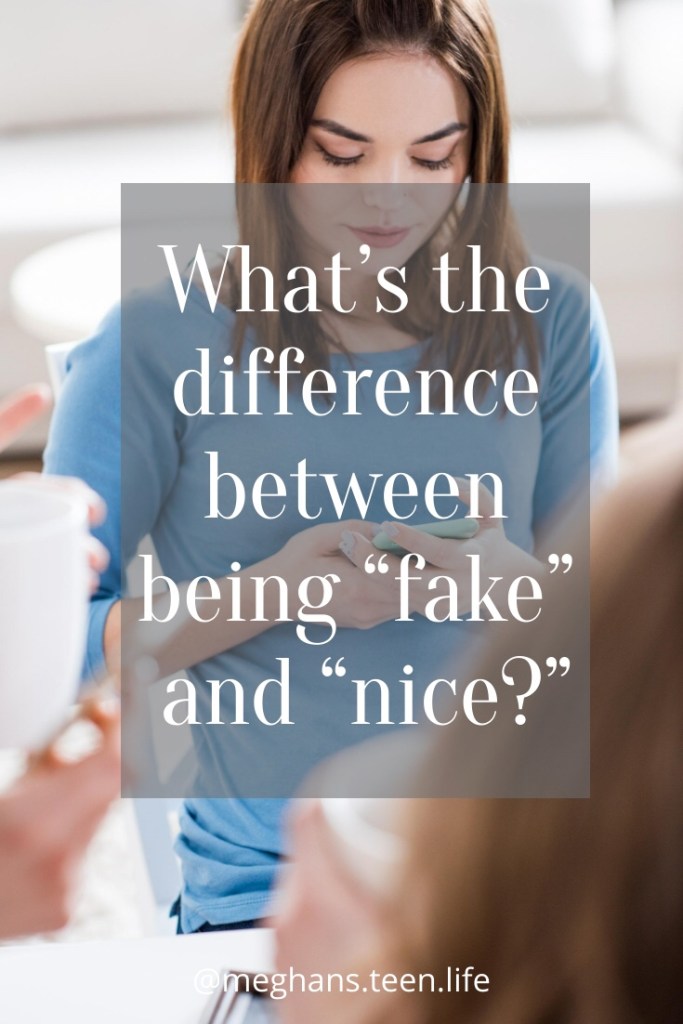Being a teenager is tough. At school, we are trapped in a building with hundreds of other teens for hours on end. We’re expected to get along with them, we don’t have to necessarily like them, we just have to get along. That’s the hard part: getting along. It’s not that we can’t be nice, it’s just troubling when you have feelings about someone and your actions have to conflict those feelings. “Fake” is a term commonly used by teens to refer to the contradiction of your actions to your beliefs, specifically towards another person. Simply, it means that one is not genuine and is often used as an insult. However, I believe that everyone is “fake” from time to time, and that when these times occur, they are meant to preserve one’s feeling and avoid conflict.

I’m sure others have experienced it: you’re approached by a kid who you don’t particularly vibe with and who you’ve probably talked trash about to your friends. So, this human, who you don’t (particularly) like is standing in front of you trying to hold a conversation. What are you supposed to do? Tell them to go away? I mean, I couldn’t do that. So, you bite the bullet and grudgingly talk to them for a few minutes. Later you’re approached by your friends and they want to know what happened. Maybe they don’t outright say it, but they question your motives, basically calling you fake.
I get caught in this dilemma all of the time, and it’s difficult. My values contradict; I don’t want to mislead anyone, but I also don’t want to be seen as mean. In order to stay as close to my morals as possible I developed the ”Authenticity Code.” This “code” determines the thin line that many use to decipher the difference between “nice” and “fake.” It states: “If one is approached by someone that they have expressed their disliking for to another person, then a short engagement is still in line with one’s morals.” Essentially, you begin to blatantly mislead a person when you go out of your way contact this person.
Related: “How To Phase Out of Your Toxic Friendship”
To clarify, by these standards the situation I described above would not be “fake” because it’s coming from a good place. You don’t want to hurt the other person feelings, so you put your feelings aside and engaged in a short conversation without completely misleading them. On the other hand, a situation which would be classified as “fake” can be found in “Mean Girls.” Think about when Cady and Regina are in the hall and Regina stops one of her classmates to compliment her skirt. When the girl leaves, Regina turns to Cady and says, “That is the ugliest effing skirt I’ve ever seen.” Regina’s behavior in this scene can 100% be classified as “fake;” she goes out of her way to give an ill intentioned compliment to someone.

Before I leave you, I wanted to mention that being “fake” is purely a harsh social term. I use it in this post to make it more relatable to teens, and you are definitely not a bad person if your actions contradict your feelings, specifically towards another person. We are all human and make mistakes. The important thing is to learn from those mistakes. I really hope that this put the term “fake” into a better perspective and that you use the “Authenticity Code” to remain genuine. Thank you for reading!

“Being a teenager is tough” ! I really felt that :)! Hahha, I don’t know if you’ve read the Catcher in the Rue but basically the main character Holden refers to people as phony. This whole post about the difference between being fake and nice reminded me of that book!
LikeLike
Oh!! I’ve never read! I’ll have to check it out! Great connection😉💕
LikeLiked by 1 person
I always associated a person being “fake” when they take the initiative to talk or hang with someone they don’t like, because they’re hoping to get something back in return from them. Also, I associate a person being “nice” when they don’t have nothing they’re looking to gain, but just decide to treat someone as they would like to be treated, because it’s the right thing to do.
LikeLiked by 2 people
Yes! I totally agree! That’s such a great way of putting it— super insightful.💕
LikeLike
A very interesting post. Perhaps it’s also fake to make an extra effort to be nice to people who don’t like you and that you aren’t particularly fond of either 🤷🏼♀️ most people want to be the nice one, the person who is never involved in conflict but brilliant at diffusing it.
LikeLiked by 1 person
So true! This also brings up the difference between nice and kind. Very interesting! Thanks for reading Maryam!!💕
LikeLiked by 1 person
Absolutely! x
LikeLiked by 1 person
I’ve definitely had my experience with these kinds of people! I’ve learned to always be nice to whoever I talk to and ignore what other people say unless they’re my close friends since I know they’re always looking out for me ☺️
LikeLike
This was such a great post! I’ve definitely had my share of experiences with such people, especially considering the fact that I was one of them until a few years ago. Being an introvert has it’s own benefits in a way. You don’t have to fake yourself for anyone. Insightful read!
LikeLike
Definitely agree about the benefits of being an introvert! Thanks for reading!💓😉
LikeLiked by 1 person
My pleasure!
LikeLiked by 1 person